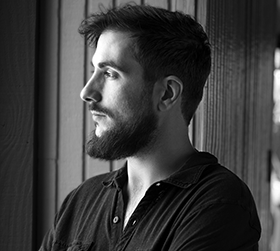The Other Side of Nowhere
Thirty feet above the ground, in a warehouse
in the industrial outskirts
of a city we’d never lived in,
I knelt inside the near-empty container
to contemplate our nomadic misery:
mismatched chairs, kitchen appliances
older than me, baby clothes,
framed diplomas, books in a language
my father never taught me (it would
have stunted my assimilation)
and in my head, an email from my mother
that read, “we’re doomed, save what you can.”
So there I was, on the other
side of nowhere in sunny Italy… Despite
the technological changes around us,
disasters still travel in telegrams: Bankrupt. STOP.
Sorry. STOP. Homeless. STOP…
Remember, brother,
when our parents calling us
‘global citizens’ inspired great hope?
But the world proved too tribal for us
and so your suitcase shall be your only friend
while Shi Huang’s fantasy of a Godly Wall
proliferates across the planet.
Weeks ago, two cops in Catania
stung a sixteen year old boy from Darfur
with cattle-prods to impart the following lesson,
‘whatever the government says,
you’re not welcome here.’
As if one needed the reminder…
All across the boot, the green-
shirted faithful lift their pitchforks
to chase the monster of Otherness,
so don’t ask me why I love
to leave and hate returning.
(Is the answer somewhere inside this container?
It isn’t… but remember Cicero’s saying,
there’s no cure for exile except to love
every city as you would your own,
but the past is always easier… )
When I was young, I fancied
myself Indiana Jones; later,
with erudition, came realer idols:
Petrie, Schliemann, Carter, Kenyon—
but you cannot rescue history from dust—
all you save one day will crumble
in your hand. “Trash or burn the rest”
I told the warehouse worker
as we rode the forklift back to earth.
Damn whoever said
that hell was down below;
they clearly never went there.
Florence
Copyright © 2021 by André Naffis-Sahely. Originally published in Poem-a-Day on April 10, 2021, by the Academy of American Poets.
“Following nearly thirty years of toil as a migrant worker in the United Arab Emirates, my father was forced to leave a country he'd spent much of his life helping to build, and like millions of people before him in his position, he found himself penniless after three decades in one of the world's richest boom towns. Ever itinerant, our family found itself back in Italy, a country we hadn't lived in since I'd been a child, and a place where none of us had ever felt comfortable, partly due to the country's intense xenophobia. 'The Other Side of Nowhere' is my attempt to capture that painful transition.”
—André Naffis-Sahely

